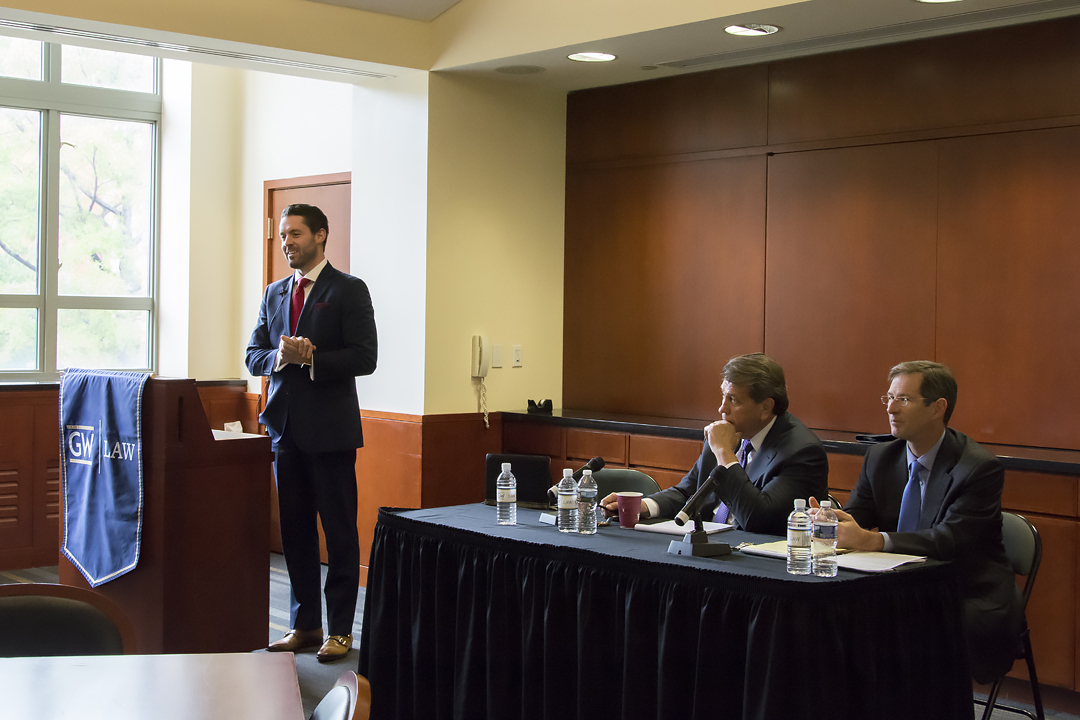The National Security Program and the National Security Law Association hosted a discussion with students last month on the state of Homeland Security and how the department has evolved since the 9/11 attacks. The Honorable Stevan E. Bunnel, Partner, O'Melveny; and Former General Counsel, U.S. Department of Homeland Security, and the Honorable Joe D. Whitley, Shareholder, Baker Donelson; and Former General Counsel, U.S. Department of Homeland Security, participated in the conversation. Joshua M. Snavely, LLM '13, Dean, Langston University School of Business, served as the moderator.
Last month marked the 16th anniversary of the 9/11 terrorist attacks. Hon. Bunnel and Hon. Whitley began the conversation by recalling where they were when the attacks took place in New York. At the time, Hon. Whitley served as an attorney in the Northern and Middle Districts of Georgia in Atlanta. He shared that on that day, he was representing an individual in a court-martial proceeding in North Carolina. Hon. Whitley said he found out about the attacks like everyone else: it was quickly reported on live TV. "The world completely changed in a span of a few hours," Hon. Whitley said. Hon. Bunnel, who worked in the front office of the Criminal division at the Justice Department and was counsel to Michael Chertoff, Assistant Attorney General, had a different experience—he was off that day. Hon. Bunnel went to work the next day and recalled how chaotic the scene was. "At that point in time there was no national security division and there was no real structure," he said. In the history of the United States, there has not been foreign aggression within the borders of the country since the attack on Pearl Harbor, which offers a brief explanation as to why the United States was unprepared for an attack on the Twin Towers. Hon. Bunnel shared how difficult it was to go to work due to the emotional impact of that event. However, even during those difficult moments, he said there were many dedicated patriotic operators who were there to do everything they could to accomplish whatever the job was.
Following 9/11, the federal government moved quickly to develop a security framework to protect the United States from large-scale attacks directed from abroad, while enhancing federal, state, and local capabilities to prepare for, respond to, and recover from threats and disasters. A key element of this framework included the creation of the Department of Homeland Security (DHS) in March, 2003, bringing together 22 separate agencies and offices into a single, Cabinet-level department. Hon. Whitley became the first General Counsel for DHS, serving from 2003-2005.
Hon. Whitley explained that there were only seven lawyers within the DHS at the time. He was asked to create the DHS General Counsel Office because of his background in private practice. He also had an idea of how the office should be structured. Eventually, the department grew over time and currently there are approximately 2000 lawyers across the conglomerate, in about 100 different locations. Hon. Bunnel, who left the criminal division after 9/11 and served as the General Counsel of DHS from 2013-2017, was responsible for advising the Secretary and the Department's senior leadership on all significant legal, policy, and operational issues. He led many lawyers in the Department's headquarters and operating components.
Toward the end of the conversation, the panelists offered students insight into the role of a government lawyer and the lawyer-client relationship. Government lawyers may practice law in the same manner as a private attorney, and their day-to-day focus will be on the laws and policies that affect their governing body. But who exactly are their clients? There is often confusion as to who the government lawyer serves: Is it the President, Secretary, or the American People? Young professionals will eventually learn that there is "no precise answer to that," Hon. Bunnel said. "But I always saw my role as a government lawyer as that I represent the United States…you have a duty to the Constitution and to the larger interest of the country."


